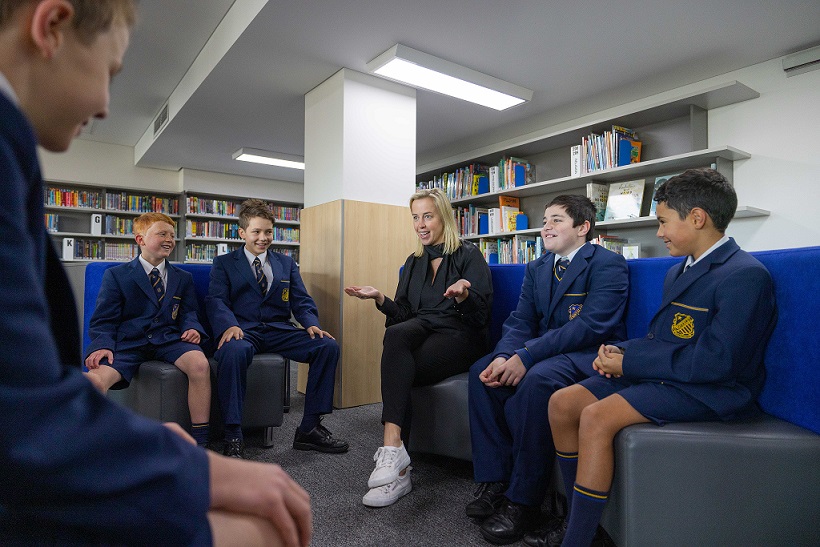
by Gabrielle Smith, Deputy Principal at Waverley College
As educators, it’s our job to provide students with the skills and knowledge they need to thrive. This is essential not just for academic achievement, but to ensure they have the tools to live a long, happy and fulfilling life.
According to recent research, our children need help with this now more than ever. The World Health Organisation has found that more than 80% of adolescents around the world do not get enough physical activity each week, putting their current and future health at risk. This coupled with the fact that roughly one in seven Australian children aged between 4-17 has already experienced a mental health disorder shows that we need to be doing more to help students care for their physical and mental well-being.
Here’s how your school can step up to the plate by implementing interesting and enjoyable well-being initiatives.
Engage students with practical workshops and guest speakers
Getting students out of the classroom and involved in practical opportunities to learn about their own health and well-being can be a great way to demonstrate just how beneficial certain activities can be.
Waverley College recently hosted a wide range of impressive speakers across all different health fields to generate excitement around the topic of health and wellness. Former NRL Roosters star Anthony Minichiello spoke about the power of nutrition in healing and repairing the body, Caitlin Reid, an elite sports dietician, discussed the hot topic of protein and how boys can effectively use it to lead a healthy lifestyle, and Dr James Roy, an interventional cardiologist, provided insight into the importance of achieving a healthy heart through diet and nutrition.
By inviting speakers who boys look up to for their personal achievements, interesting stories, and impressive careers, our students got to learn about these topics in a way that wouldn’t be possible in a traditional classroom setting.
In addition to guest speakers, we hosted a range of workshops to encourage a hands-on approach to learning. This included a weightlifting workshop with a professional weightlifter who demonstrated the safe and proper way to enjoy weight training, while also delving into its benefits. A physio station was set up to provide guidance on what stretches can be used to care for different parts of the body and a nurse's station provided heart and blood pressure checks for all students.
The inclusion of practical activities provided a fun and interesting way for students to learn about all the different aspects of health and wellness and the simple ways they can take care of themselves day to day.
Provide support options for those who need it
It’s not uncommon for children who struggle with mental health problems to feel overwhelmed and alone, especially if difficult feelings arise while at school. Taking a proactive approach to supporting students with initiatives that have been shown to improve mental health is a great way to make these difficult times more manageable.
At Waverley College, we’ve recently introduced Mabel, a 22-month-old Golden Retriever who is specially trained as a therapy dog to provide psychological interventions to students. This was an initiative our school psychologist suggested we implement following her previous experience with therapy dogs and coupled with research showing they improve confidence, reduce aggression, and boost motivation among students.
Mabel can also provide support and comfort for students who attend sessions with our school psychologist, helping them to more easily talk about the issues that are on their minds.
There are plenty of other ways that schools can implement support initiatives, too. Creating a ‘calm room’ where students can take time out to regulate their emotions, do some self-reflection, or manage sensory overload is a relatively easy but very impactful way to encourage self-care. Running regular meditation sessions, implementing mindful movement activities like yoga, or setting time aside for classes to journal at the end of the day are also great ways to foster mentally and physically healthy habits in students.
Provide mental health support groups
With the rates of mental illness amongst adolescent children continuing to rise, providing group therapy sessions for affected students is a great way to ensure they are getting the help they need. Waverley College began offering a therapy group called ‘Chill’ in term three of this year, offering a safe space for students who experience anxiety to talk about their feelings and learn practical tips on how to manage anxious thoughts.
In addition to being a great way to support students, therapy groups can also help to break down the stigma surrounding mental illness and encourage children to talk about their struggles openly. In the short time our group has been running, we’ve had a great response from both students and parents who say it’s made an improvement in their child’s life, demonstrating just how powerful these simple initiatives can be.
As our students prepare to move into a complex, ever-changing world, it’s essential that we prepare them to look after themselves both physically and mentally. With an empathetic approach based on research and an understanding of your student’s unique needs, schools can make a huge difference to their present and future well-being.
Gabrielle Smith joined Waverley College in 2018 as Director of the Junior School, bringing considerable expertise in the delivery of innovative and challenging pedagogy. She holds a Master of Education and Bachelor of Education, and was recently awarded a National Excellence in School Leadership Initiative Scholarship. Gabrielle is passionate about delivering an education that equips the students in her care with the skills to thrive in the world they will enter at the completion of school. The world is changing at a rapid rate, and students need to be able to critically think, communicate, collaborate and create to keep up. She believes in the importance of driving school-wide pedagogy that supports this through the explicit teaching of these domains.


